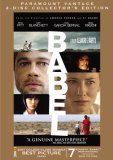| Reviews & Columns |
|
Reviews DVD TV on DVD Blu-ray 4K UHD International DVDs In Theaters Reviews by Studio Video Games Features Collector Series DVDs Easter Egg Database Interviews DVD Talk Radio Feature Articles Columns Anime Talk DVD Savant Horror DVDs The M.O.D. Squad Art House HD Talk Silent DVD
|
DVD Talk Forum |
|
|
| Resources |
|
DVD Price Search Customer Service #'s RCE Info Links |
|
Columns
|
|
|
Babel: Two-Disc Collector's Edition
Paramount // R // September 25, 2007
List Price: $34.99 [Buy now and save at Amazon]
Opinions spread wide on the potency of Babel, Alejandro González Iñárritu's recent award-winning film about cultural disconnection and traumatic echo. It's a heavily impacting film that accelerates on all cylinders to invoke emotions in its audience, whether we desire to feel them or not. With that aggressiveness in mind, each segmented vignette and their stellar character portrayals, especially within the phenomenal support from Rinko Kikuchi and Adriana Barraza, make this thought-provoking conclusion to Iñárritu's triad of emotionally dissecting films a touching achievement.
The Film:

Babel takes on the cornerstone ideal of meddled communication across cultures through a breathtaking cinematic style. While referencing the tale of the Tower of Babel's assembly and the confusement of language ordained by God, we're gracefully breezed into the impact and reverberations of cross-cultural misalignment through the violent shooting of an American woman in Morocco. As the shot echoes, both literally and figuratively. it's much like a pebble plopped into a vast pond. Tremors of this incident sprawl to the corners of the world towards four separate families as its effects either directly or indirectly impose upon their lives.
In a furious display of interconnective chaos, we're thrust vigorously across borders and cultures with widened eyes in Babel. We see the fading light within a family as a wife (Cate Blanchett)'s bullet wound seeps the color clean from her cheeks in the core of the Middle East. All the while, the husband (Brad Pitt) fights through American embassy communication for nothing more than an ambulance for his wife's care. Her assailants, two young Moroccan boys mistakenly believed to be terrorists, scramble back to their home in anticipation of backlash. Halfway across the world, the American family's housekeeper (Adriana Barraza) puts their children in harm's way as she travels across the Mexican border to her son's wedding with them. She then fights for their very lives when a simple negligence turns the situation awry. Then, the aching desperation of a mute Japanese teenage girl (Rinko Kikuchi) flushes the screen with angst as she thrashes through adolescent growth, connected to this story purely through her father's roundabout tie to the shooting.


Iñárritu's insight into this "ripple effect" potently slugs you with disarming evocation and solid characterization. Just like most fragmented stories pouring onto celluloid, some plot deviations carry more strength and adherent focus than others. However, each one carries its own fervent clout. Humanity's fragility teeters within each character, whether it's the imprints of cross-cultural chaos or the literal balance of mortality. Though effective and beautiful, it can also be quite disheartening. That jaded view becomes quite evident as each scenario takes turns for the worse within miswired interpersonal connection. Babel fumes with a hopeless, heartbreaking outlook upon its themes. Thankfully, we latch onto the humanity of our characters for solace.
Character portrayal is an essential portion of such an expressive film, and thankfully Iñárritu and Guillermo Arriaga's script breathes life into every single one. Some try diligently to shake off their inherent charisma, such as Brad Pitt (Golben-Globe nominated for Best Supporting Actor) and Gael Garcia Bernal. Their performances brim with strength as some of their firmer projections to date, but they lack the standout power to negate their worldly presence. Cate Blanchett, however, works her subtle magic as she always does in her sparsely spoken, yet pivotal, role. She gleams, radiates even, within every scene in which she opens her lips. Though she's not made to stand out, her natural capacity to allure the viewer can't help but grab your attention. An equally captivating casting decision comes in Iñárritu's usage of fresh faces across the board for Babel, especially within Morocco. Our two young boys toting the infamous gun harness a pure honesty about their personas, one that probably couldn't pour through with more seasoned child actors.
But the strongest performances lie within two key supporting roles, cultivated from the talents of Adriana Barraza and the incredible Rinko Kikuchi. Both these actresses deserve their reception for nominations in several forums, namely the Academy Awards and the Golden Globes, for their stellar work as Amelia and Chieko respectfully. Barraza, with Gael Garcia Bernal's continued support, gives us a potent reason to keep our focus on the Mexican scenes. Not that the story isn't engaging in itself, but for the sake of the film's core purpose this piece feels the most misaligned and forceful. Barraza helps us maintain focus on this unnerving deviation with her electric performance.


Rinko Kikuchi, however, is the knock-out show stealer here to the highest order. Her uneasy, voiceless Chieko takes on one of the most engaging and uniquely hypnotizing supporting presences I've had the pleasure to behold. Together with Iñárritu's careful eye watching over her character's inability to speak or hear, Kikuchi's raging portrayal of strife through a sexually and socially frustrated teenager is thoroughly gripping. Her facial expressions of angst and disgruntled body language speak volumes where Chieko's silence cannot. At times, it's near unavoidable to wish that we could stay solely focused on her and her father's woes amidst the beautiful neon Japanese skyline.
Babel sweeps across our vision with an effervescent cultural fluency, both in scope and tangible brilliance. Nothing escapes our absorption as we scale across Middle Eastern deserts, Mexican fiestas, and Japan's rich neon glow. As we watch traditional Moroccan finger food consumption in a common bowl and Mexicans dancing the night away at a boisterous wedding, we harness the rich presence of each way of life in pure delight. Even when blanketed by the film's escalating tension, that sense of honest candor within each familial scene is something we relish. Iñárritu and his standard director of photography, Rodrigo Prieto of 21 Grams and Brokeback Mountain fame, capture a splendid level of magnificence within each fluctuating climate.
The real spotlight in aesthetics though, and one of the strongest reasons that'll rope in your interest for subsequent visits into Babel, shines radiantly in the phenomenal score from Gustavo Santaolalla. Each spine-tingling flutter from string and wind instruments match these temperaments quite well. Then, when the film is quiet, it paves way for sweeping breadth in the ambient chatterings of near silence. Babel's genteel aural presence can really stun the ears when it wants to.
But are these production values and proficiently solid character performances enough to warrant your return towards Babel's melancholy outlook on a broken, yet densely interconnected, narrative? In ways, it's both yes and no to equal measures. Before I sat down to absorb Babel a second time, I had a small map in my head of what elements might and might not be worth a second trip. The visual style, the music, and the stunning array of supportive performances wedged into this very gloomy tale stood out as elements I was eager to soak in once again. These points radiate just enough to give Iñárritu's work lasting appeal, though the film itself stands equally as wrenching and imposing as the first experience.
Babel still seems to fight a bit hard to make you feel that aching, negative sensation in the pit of your stomach over cultural disconnection. Getting lost within its tainted intuitive translations, however, makes the film alluringly painful to behold. Director Iñárritu closes his emotionally charged volume of films with a sweeping finale. Though as a whole his other films still chime a stronger chord with me, especially 21 Grams, Babel holds solid in my eyes as an achingly touching drama rich with cinematic poignancy.
The DVD:


Babel is presented from Paramount in a double disc keepcase with hubs on each side of the casing. Each disc comes with a silver surface with the film's title typed vertically on the left side. For reference, the menus should look strikingly familiar since it appears that the first disc of Babel: Collector's Edition is the exact same as the initial release. This is not a bad thing, though, because the presentation on that disc is very solid. "Disc 1" and "Disc 2" are, however, printed on the lower portions of the discs.
The Video:
Presented in a 1.85:1 anamorphic widescreen presentation, the transfer for Babel packs a very solid punch. The photography in the film harnesses a gorgeous natural color palette and strongly grainy image that replicates fluidly onto this disc. Tokyo displays an appropriately lambast level of color, while the sands outskirts of Morocco grasp its own unique beauty amidst the tans and grayish blues of the sandy mountains. Detail is very sharp across the board as facial details and fluctuating location designs maintain holistic strength. It's a beautifully shot film with a beautiful transfer to mirror such an effort.
The Audio:
Last time I soaked in Babel with its Dolby 5.1 aural presentation, I was impressed with the verbal and musical crispness. However, the fluctuating musical accompaniment can grow quite sporadic in the lower frequency department. I still picked up on the same points this second time around, but they weren't near as grating. That's not a change in the sound quality of the disc, just a personal change in observation. LFE levels still hit high marks as we glide through the Japanese night club and the Mexican scenery. It feels a bit overbearing, but nothing that's beyond manageable. Overall, the crispness of the score is outstanding across the board, save those unique instances. Verbal clarity and mild effect strength are also handled exceptionally. Dolby 2.0 and French 5.1 options are also available, as are English and Spanish optional subtitles.
The Extras:
Here's the selling point of a Collector's Edition of Babel: the supplements. This is a hard call, too. We're working with one, yes one, tacked on special feature outside of a Theatrical Trailer and Previews on the first disc. However, it's an incredibly well made and engaging piece that actually makes this DVD a difficult decision.
- Common Ground: Under Construction Notes -
Included on a disc all its own, Common Ground is technically not the most proficient piece. It's presented in a non-anamorphic transfer and only available in Dolby Stereo. That knocks down the dynamic properties a shade, but it's still well presented otherwise. The Dolby track sounds just fine, though it fluctuates a shade in audibility with vocal points. After a bit of research, I believe that this Common Ground documentary is the same "making of" feature that's available in other regions.
Now, with that out of the way, I can gush a little bit about how flowing this documentary is. Intimacy is the key word here. Common Ground isn't a standard marketing piece that glosses over the viewer with ramshackle interviews and such. No, we're actually working with legit, engaging material that's highly pleasurable to absorb. We're taken on a pathway that cycles from Iñárritu's casting decisions for non-experienced actors and the challenging task of attempting to mask Brad Pitt's universal recognition, to the struggles of maintaining the cast's concentration across several issues like Moroccan house chores or authoritative degradation of the experience for one of the younger performers. Turning over stones to discover little glimmering treasures about the true assembly of Babel is Common Ground's forte, and it does so with sublime resonance.
Describing structure isn't very easy with this 90-minute documentary. It's not really separated into defined chapters with this presentation. However, once we reach a country, whether we're in Japan, Mexico, or Morocco, the focus stays strong with filming elements about that country for a lengthy span. We don't cut and dash from place to place hastily. Instead, we see a proficient amount of material featuring each locale with some very intimate shots captured. Then, once we think we haven't seen featured material from one country in a spell, then the documentary seems to read our minds and shift towards that location. It spreads across each vignette in the film quite well. You don't see a lot of face-on interviews, though there's a few scattered here and there. Instead, we're taken in as an onlooker, almost as a production assistant even, as we eavesdrop on conversations and witness the intricate assembly of this film.
We see a lot of Iñárritu in this piece, and it's not just positive rambling either. Brad Pitt makes a great statement that sounds quite fitting; he says something to the effect of giving "Kubrick" another take when Iñárritu wants to shoot a scene again. Iñárritu appears to be similarly difficult and intricate in the director's chair. However, it's that same kind of stringent difficulty that carries a proficient level of clout, not just as an angry control freak. He degrades the lackluster attempts of his crew at times, from a non-ideal effort to display Blanchett's bullet wound to the weaknesses of some of his extras. With each punch of harshness he tosses out, we also see his heartfelt artistry. Even more fascinating is that we see him hammer home the dramatic motivations, which he does so with equally as intense force as his films themselves, to many of his players. He's a very compelling director to watch.
Common Ground is, in itself, compelling. The music in the background, featuring several cues from the film, is very solid as it accompanies our journey along building this film. More importantly, there's very little walled up behind the cast and crew about this piece. It's a poetic director's commentary, making of featurette, production clip montage, and overall grandiose portrait of Babel that's a delight to soak in. It's a phenomenal insight if you enjoyed the film, but it also might help you appreciate Iñárritu's efforts a bit more if you had mixed reservations about you feelings on the film.
-----
Final Thoughts:
Iñárritu has meticulously assembled an emotionally and culturally complex tear-jerker in Babel. Though the sum of its parts isn't nearly as cohesive as each individual portion, our finished product is an engaging dramatic accomplishment. The film, in its beautifully engrossing yet overcast disposition, comes Highly Recommended.
This Babel: Collector's Edition is a tricky one to recommend, however. The Common Grounds portion of the set gives us some surprisingly intimate views into the film's process of assembly. It makes for a stronger package regarding the behind the camera activity and a great viewing experience after the film. However, while we're sitting at a higher list price ($34.99) for the same pressing of the first disc and an a tacked-on documentary, this set can only be lightly Recommended to check out the expansive production doc. For many, purely a rental will suffice just to see it, especially if you already own the prior release. It all depends on how much one solid and exceptionally sprawling special feature is worth to you.
Thomas Spurlin, Staff Reviewer -- DVDTalk Reviews | Personal Blog/Site
The Film:

Babel takes on the cornerstone ideal of meddled communication across cultures through a breathtaking cinematic style. While referencing the tale of the Tower of Babel's assembly and the confusement of language ordained by God, we're gracefully breezed into the impact and reverberations of cross-cultural misalignment through the violent shooting of an American woman in Morocco. As the shot echoes, both literally and figuratively. it's much like a pebble plopped into a vast pond. Tremors of this incident sprawl to the corners of the world towards four separate families as its effects either directly or indirectly impose upon their lives.
In a furious display of interconnective chaos, we're thrust vigorously across borders and cultures with widened eyes in Babel. We see the fading light within a family as a wife (Cate Blanchett)'s bullet wound seeps the color clean from her cheeks in the core of the Middle East. All the while, the husband (Brad Pitt) fights through American embassy communication for nothing more than an ambulance for his wife's care. Her assailants, two young Moroccan boys mistakenly believed to be terrorists, scramble back to their home in anticipation of backlash. Halfway across the world, the American family's housekeeper (Adriana Barraza) puts their children in harm's way as she travels across the Mexican border to her son's wedding with them. She then fights for their very lives when a simple negligence turns the situation awry. Then, the aching desperation of a mute Japanese teenage girl (Rinko Kikuchi) flushes the screen with angst as she thrashes through adolescent growth, connected to this story purely through her father's roundabout tie to the shooting.


Iñárritu's insight into this "ripple effect" potently slugs you with disarming evocation and solid characterization. Just like most fragmented stories pouring onto celluloid, some plot deviations carry more strength and adherent focus than others. However, each one carries its own fervent clout. Humanity's fragility teeters within each character, whether it's the imprints of cross-cultural chaos or the literal balance of mortality. Though effective and beautiful, it can also be quite disheartening. That jaded view becomes quite evident as each scenario takes turns for the worse within miswired interpersonal connection. Babel fumes with a hopeless, heartbreaking outlook upon its themes. Thankfully, we latch onto the humanity of our characters for solace.
Character portrayal is an essential portion of such an expressive film, and thankfully Iñárritu and Guillermo Arriaga's script breathes life into every single one. Some try diligently to shake off their inherent charisma, such as Brad Pitt (Golben-Globe nominated for Best Supporting Actor) and Gael Garcia Bernal. Their performances brim with strength as some of their firmer projections to date, but they lack the standout power to negate their worldly presence. Cate Blanchett, however, works her subtle magic as she always does in her sparsely spoken, yet pivotal, role. She gleams, radiates even, within every scene in which she opens her lips. Though she's not made to stand out, her natural capacity to allure the viewer can't help but grab your attention. An equally captivating casting decision comes in Iñárritu's usage of fresh faces across the board for Babel, especially within Morocco. Our two young boys toting the infamous gun harness a pure honesty about their personas, one that probably couldn't pour through with more seasoned child actors.
But the strongest performances lie within two key supporting roles, cultivated from the talents of Adriana Barraza and the incredible Rinko Kikuchi. Both these actresses deserve their reception for nominations in several forums, namely the Academy Awards and the Golden Globes, for their stellar work as Amelia and Chieko respectfully. Barraza, with Gael Garcia Bernal's continued support, gives us a potent reason to keep our focus on the Mexican scenes. Not that the story isn't engaging in itself, but for the sake of the film's core purpose this piece feels the most misaligned and forceful. Barraza helps us maintain focus on this unnerving deviation with her electric performance.


Rinko Kikuchi, however, is the knock-out show stealer here to the highest order. Her uneasy, voiceless Chieko takes on one of the most engaging and uniquely hypnotizing supporting presences I've had the pleasure to behold. Together with Iñárritu's careful eye watching over her character's inability to speak or hear, Kikuchi's raging portrayal of strife through a sexually and socially frustrated teenager is thoroughly gripping. Her facial expressions of angst and disgruntled body language speak volumes where Chieko's silence cannot. At times, it's near unavoidable to wish that we could stay solely focused on her and her father's woes amidst the beautiful neon Japanese skyline.
Babel sweeps across our vision with an effervescent cultural fluency, both in scope and tangible brilliance. Nothing escapes our absorption as we scale across Middle Eastern deserts, Mexican fiestas, and Japan's rich neon glow. As we watch traditional Moroccan finger food consumption in a common bowl and Mexicans dancing the night away at a boisterous wedding, we harness the rich presence of each way of life in pure delight. Even when blanketed by the film's escalating tension, that sense of honest candor within each familial scene is something we relish. Iñárritu and his standard director of photography, Rodrigo Prieto of 21 Grams and Brokeback Mountain fame, capture a splendid level of magnificence within each fluctuating climate.
The real spotlight in aesthetics though, and one of the strongest reasons that'll rope in your interest for subsequent visits into Babel, shines radiantly in the phenomenal score from Gustavo Santaolalla. Each spine-tingling flutter from string and wind instruments match these temperaments quite well. Then, when the film is quiet, it paves way for sweeping breadth in the ambient chatterings of near silence. Babel's genteel aural presence can really stun the ears when it wants to.
But are these production values and proficiently solid character performances enough to warrant your return towards Babel's melancholy outlook on a broken, yet densely interconnected, narrative? In ways, it's both yes and no to equal measures. Before I sat down to absorb Babel a second time, I had a small map in my head of what elements might and might not be worth a second trip. The visual style, the music, and the stunning array of supportive performances wedged into this very gloomy tale stood out as elements I was eager to soak in once again. These points radiate just enough to give Iñárritu's work lasting appeal, though the film itself stands equally as wrenching and imposing as the first experience.
Babel still seems to fight a bit hard to make you feel that aching, negative sensation in the pit of your stomach over cultural disconnection. Getting lost within its tainted intuitive translations, however, makes the film alluringly painful to behold. Director Iñárritu closes his emotionally charged volume of films with a sweeping finale. Though as a whole his other films still chime a stronger chord with me, especially 21 Grams, Babel holds solid in my eyes as an achingly touching drama rich with cinematic poignancy.
The DVD:


Babel is presented from Paramount in a double disc keepcase with hubs on each side of the casing. Each disc comes with a silver surface with the film's title typed vertically on the left side. For reference, the menus should look strikingly familiar since it appears that the first disc of Babel: Collector's Edition is the exact same as the initial release. This is not a bad thing, though, because the presentation on that disc is very solid. "Disc 1" and "Disc 2" are, however, printed on the lower portions of the discs.
The Video:
Presented in a 1.85:1 anamorphic widescreen presentation, the transfer for Babel packs a very solid punch. The photography in the film harnesses a gorgeous natural color palette and strongly grainy image that replicates fluidly onto this disc. Tokyo displays an appropriately lambast level of color, while the sands outskirts of Morocco grasp its own unique beauty amidst the tans and grayish blues of the sandy mountains. Detail is very sharp across the board as facial details and fluctuating location designs maintain holistic strength. It's a beautifully shot film with a beautiful transfer to mirror such an effort.
The Audio:
Last time I soaked in Babel with its Dolby 5.1 aural presentation, I was impressed with the verbal and musical crispness. However, the fluctuating musical accompaniment can grow quite sporadic in the lower frequency department. I still picked up on the same points this second time around, but they weren't near as grating. That's not a change in the sound quality of the disc, just a personal change in observation. LFE levels still hit high marks as we glide through the Japanese night club and the Mexican scenery. It feels a bit overbearing, but nothing that's beyond manageable. Overall, the crispness of the score is outstanding across the board, save those unique instances. Verbal clarity and mild effect strength are also handled exceptionally. Dolby 2.0 and French 5.1 options are also available, as are English and Spanish optional subtitles.
The Extras:
Here's the selling point of a Collector's Edition of Babel: the supplements. This is a hard call, too. We're working with one, yes one, tacked on special feature outside of a Theatrical Trailer and Previews on the first disc. However, it's an incredibly well made and engaging piece that actually makes this DVD a difficult decision.
- Common Ground: Under Construction Notes -
Included on a disc all its own, Common Ground is technically not the most proficient piece. It's presented in a non-anamorphic transfer and only available in Dolby Stereo. That knocks down the dynamic properties a shade, but it's still well presented otherwise. The Dolby track sounds just fine, though it fluctuates a shade in audibility with vocal points. After a bit of research, I believe that this Common Ground documentary is the same "making of" feature that's available in other regions.
Now, with that out of the way, I can gush a little bit about how flowing this documentary is. Intimacy is the key word here. Common Ground isn't a standard marketing piece that glosses over the viewer with ramshackle interviews and such. No, we're actually working with legit, engaging material that's highly pleasurable to absorb. We're taken on a pathway that cycles from Iñárritu's casting decisions for non-experienced actors and the challenging task of attempting to mask Brad Pitt's universal recognition, to the struggles of maintaining the cast's concentration across several issues like Moroccan house chores or authoritative degradation of the experience for one of the younger performers. Turning over stones to discover little glimmering treasures about the true assembly of Babel is Common Ground's forte, and it does so with sublime resonance.
Describing structure isn't very easy with this 90-minute documentary. It's not really separated into defined chapters with this presentation. However, once we reach a country, whether we're in Japan, Mexico, or Morocco, the focus stays strong with filming elements about that country for a lengthy span. We don't cut and dash from place to place hastily. Instead, we see a proficient amount of material featuring each locale with some very intimate shots captured. Then, once we think we haven't seen featured material from one country in a spell, then the documentary seems to read our minds and shift towards that location. It spreads across each vignette in the film quite well. You don't see a lot of face-on interviews, though there's a few scattered here and there. Instead, we're taken in as an onlooker, almost as a production assistant even, as we eavesdrop on conversations and witness the intricate assembly of this film.
We see a lot of Iñárritu in this piece, and it's not just positive rambling either. Brad Pitt makes a great statement that sounds quite fitting; he says something to the effect of giving "Kubrick" another take when Iñárritu wants to shoot a scene again. Iñárritu appears to be similarly difficult and intricate in the director's chair. However, it's that same kind of stringent difficulty that carries a proficient level of clout, not just as an angry control freak. He degrades the lackluster attempts of his crew at times, from a non-ideal effort to display Blanchett's bullet wound to the weaknesses of some of his extras. With each punch of harshness he tosses out, we also see his heartfelt artistry. Even more fascinating is that we see him hammer home the dramatic motivations, which he does so with equally as intense force as his films themselves, to many of his players. He's a very compelling director to watch.
Common Ground is, in itself, compelling. The music in the background, featuring several cues from the film, is very solid as it accompanies our journey along building this film. More importantly, there's very little walled up behind the cast and crew about this piece. It's a poetic director's commentary, making of featurette, production clip montage, and overall grandiose portrait of Babel that's a delight to soak in. It's a phenomenal insight if you enjoyed the film, but it also might help you appreciate Iñárritu's efforts a bit more if you had mixed reservations about you feelings on the film.
-----
Final Thoughts:
Iñárritu has meticulously assembled an emotionally and culturally complex tear-jerker in Babel. Though the sum of its parts isn't nearly as cohesive as each individual portion, our finished product is an engaging dramatic accomplishment. The film, in its beautifully engrossing yet overcast disposition, comes Highly Recommended.
This Babel: Collector's Edition is a tricky one to recommend, however. The Common Grounds portion of the set gives us some surprisingly intimate views into the film's process of assembly. It makes for a stronger package regarding the behind the camera activity and a great viewing experience after the film. However, while we're sitting at a higher list price ($34.99) for the same pressing of the first disc and an a tacked-on documentary, this set can only be lightly Recommended to check out the expansive production doc. For many, purely a rental will suffice just to see it, especially if you already own the prior release. It all depends on how much one solid and exceptionally sprawling special feature is worth to you.
|
| Popular Reviews |
| Sponsored Links |
|
|
| Sponsored Links |
|
|
| Release List | Reviews | Shop | Newsletter | Forum | DVD Giveaways | Blu-Ray | Advertise |
|
Copyright 2024 DVDTalk.com All Rights Reserved. Legal Info, Privacy Policy, Terms of Use,
Manage Preferences,
Your Privacy Choices | |||||||













